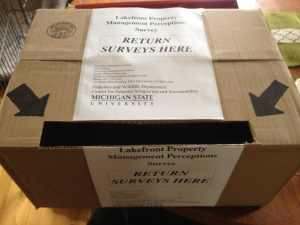Michigan Inland Lakes Convention
Add Summary

Joe Nohner is a CSIS PhD student who's studying largemouth bass, specifically how habitat helps baby largemouth survive and grow, and the socioeconomic factors that influence landowners’ habitat management choices. He's also a passionate fisherman who aims to understand the layers and layers of complexity to solve ecosystem problems. This is an excerpt from Joe's blog, Fishing for Habitat.
April 29
Later this week I’ll be attending the first Michigan Inland Lakes Convention up in Boyne, Mich., to discuss some of my results from last season’s fieldwork and to conduct my first foray into economic and social research! The conference brings together lake associations from the Michigan Lakes and Streams Association, members of the Michigan Chapter of the North American Lake Management Society, and others that conduct research, manage, or have some stake in Michigan’s lakes.
There will be about 400 participants at the conference, many of whom own or lease properties on Michigan’s lakes. I jumped at the opportunity to learn more from these participants, and will be distributing a “Lakefront Property Management Perceptions Survey” at registration and throughout the conference. One of the most frustrating aspects of being an “academic” is that you pore through research results detailing potential  impairments to healthy lake ecosystems. Then, you go to your own family’s cabin, and find the “best management practices” that create healthy lakes going out the window! How could this be? The answer is that for those of us fortunate enough to have a property on a lake, this is valuable space! We swim, boat, barbeque, fish, play horseshoes, light off fireworks, and enjoy an Oberon from time to time. We want a dock for a boat or maybe a patch of sand for the grandkids, and why not! Each property owner probably has their own priorities and goals for their property. Somewhere between the ecological research results that us academics produce and actual decisions that landowners make there are a myriad of factors at play. Differing values, experiences, incomes, education (both formal and through experience!), and a host of other real factors may influence how each person makes their decisions with valuable and limited shoreline property.
impairments to healthy lake ecosystems. Then, you go to your own family’s cabin, and find the “best management practices” that create healthy lakes going out the window! How could this be? The answer is that for those of us fortunate enough to have a property on a lake, this is valuable space! We swim, boat, barbeque, fish, play horseshoes, light off fireworks, and enjoy an Oberon from time to time. We want a dock for a boat or maybe a patch of sand for the grandkids, and why not! Each property owner probably has their own priorities and goals for their property. Somewhere between the ecological research results that us academics produce and actual decisions that landowners make there are a myriad of factors at play. Differing values, experiences, incomes, education (both formal and through experience!), and a host of other real factors may influence how each person makes their decisions with valuable and limited shoreline property.
When you step back and think of the lake as a whole, the entire shoreline is the result of individual decisions on individual properties. Our hope is that through this survey and future social and economic research, we can start to better-understand these decisions. Are there misunderstandings creating “false choices” where “win-win” solutions may be available? Can education and outreach be more efficiently targeted? Are there easy opportunities for achieving conservation goals? What motivations influence the lake habitat choices that all of us property owners make? We hope to start answering this questions, and probably generate more!



 Print
Print Email
Email





